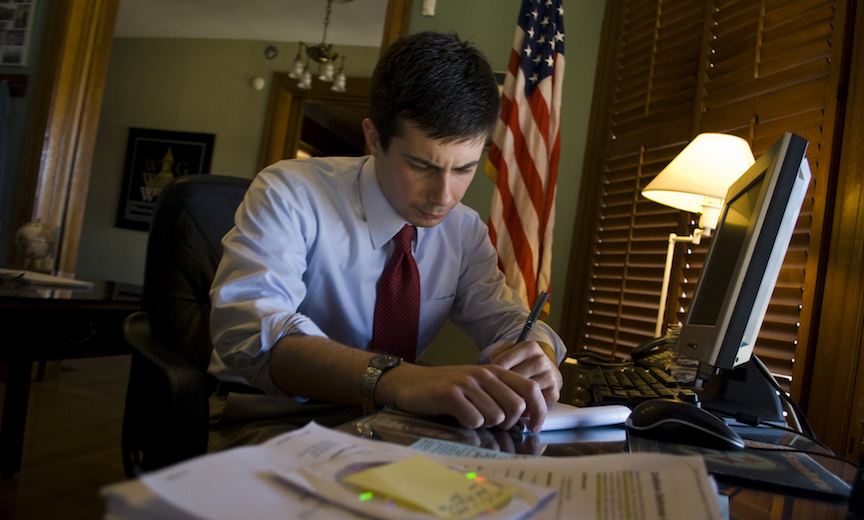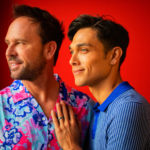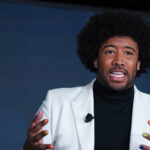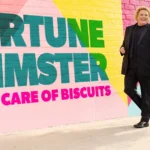Pete Buttigieg wants to be President of the United States, and his exploratory committee is about to become a full-fledged campaign. He hails from the opposite end of the political spectrum from Donald Trump, and fun fact: he just happens to be gay.
Buttigieg comes from a very different world than the current Oval Office occupant. Not only is he from the Midwest and the mayor of South Bend, Indiana, he’s a Harvard graduate, a Rhodes scholar and a veteran of the war in Afghanistan. At 37, he’s barely old enough to run for the office (the required age is 35), and if elected, he’d be the youngest ever to serve.
He’s also such a warm and affable apple pie kind of guy, you’d suspect Donald Trump eats people like him for brunch. We spoke to him on the road as he hits Iowa to test the political waters for the first time outside his home state.
Read Next | Lesbian Moms, Sperm Donors, and the Myth of the Essential Father
What He’d Prioritize
METROSOURCE: Clearly, you don’t want to be identified as a single-issue candidate just because you’re gay. What would you prioritize in the first days of a Buttigieg (pronounced Boo-te-jedge) administration?
Buttigieg: The first priority has to be democracy itself. I don’t think we’re going to be able to solve most of our major policy issues if we don’t first improve our political system where those issues come to get heard. That means everything from redistricting reform and addressing money in politics to making sure our democracy is more democratic by reconsidering the electoral college and looking at statehood for a place like D.C.and making sure people in the territories have equal rights. Every generation up until now has seen America grow more democratic, not less, and I don’t want ours to be the first where the reverse is true — but we’re on track for that if nothing changes.
So I think democracy is front and center. I’ve talked a lot about ways to enhance freedom as well. The reason I believe in making sure we have universal health care is because I think it makes people more free. I think there are a lot of other economic as well as equality considerations. And third, I think security. I think it’s time for Democrats to get back in the business of talking about security, especially when you have 21st century security challenges like climate security and election security that the other side doesn’t seem to care about at all.
More Content from Metrosource[wpp range=”last10days” cat=’16259,26,19687′ thumbnail_width=75 thumbnail_height=50 limit=3 stats_views=0]
METROSOURCE: One difference between you and Donald Trump is that you actually did serve in the military. How did that experience help you prepare to become Commander-in-Chief?
Buttigieg: First of all, it gives me a very intimate understanding of what’s at stake when a president orders young men and women to go to war, having been among those young men and women. I think it also gave me a sense of just how complex and important our structure of alliances has been. We were in a true coalition environment. And the destruction of American alliances in the last few years really does put American lives at risk, and the next president will have a lot of work to do to repair and enhance America’s role as a leader in the world. I believe that you can either resent the rest of the world, or you can lead it; but you can’t do both. And we need to make the right choice in order to be a safer country for the next generation. Third and maybe most importantly, it was just an experience that brought me together with a lot of other Americans — people from very different backgrounds; very different political views and we learned to trust each other with our lives. And I think we need more of that nationally, but it shouldn’t require going to war. It’s one of those reasons I think national service is something we really need to find a way to expand in our country.
Gays and Trans Americans in the Service
METROSOURCE: And when you talked with people in the service, how do they feel about working alongside gay and trans Americans?
Buttigieg: Most people I served with couldn’t care less. They wanted to know if you were prepared to do your job, and if they could trust you to handle a weapon or read an intelligence brief or whatever else was expected of you. The military, if I’m not mistaken, is the largest employer of transgender Americans and these are Americans who just want a chance to do a good job and serve their country like everybody else. I do not understand what motivates this president to attack people who are willing to serve — fellow Americans — especially given that he was somebody who got out of his obligation to serve when it was his turn.
I really became interested in public service when I was finishing high school and starting college. I did not realize that it would mean going back to my home town and serving in local government, but that’s something I came to understand over time. But yeah: If you had asked me when I was younger in college, I would have believed that somebody could either be out or be in elected office, but not both.
Read Next | “1000 Tattoos” Will Help You Think Ink By Checking Out the Best of the Best
The Making of the Mayor
METROSOURCE: Condolences on the recent loss of your father. How did he help shape your worldview?
Buttigieg: He was a scholar who really cared about how ideas worked in the real world. He studied a lot of social theory, literature — things that I can’t even quite understand. But to the extent that I could keep up with him, it was really being introduced to a world of ideas that had wound up causing many bad and good things to happen. He was an expert in 20th century and what had happened with fascism in Italy and a lot of other movements that really show what’s at stake not only in politics but the world of ideas and the political impact those ideas can have.
METROSOURCE: It seems the cultural fabric of our country is more frayed now than at anytime since the Vietnam era. What can you do to unite us?
Well, I hope that my story can transcend some of those divisions. I’m somebody who is a progressive Democrat, but who lives in a red state. I’m somebody who believes in a lot of maybe more traditionally conservative values like faith and family and freedom, but believes that those values are best served by progressive policies. And I’m looking forward to do being able to do what — hopefully — what I was able to do here at home, which is to draw a lot of support from Independents and Republicans. Not so much by pretending to be more conservative than I really am, but by focusing on reality, on results on lived experience and on the values that we do share.
Read Next | Express Your Inner Foodie with the New Tofuture Tofu Press
Whose Indiana is it, Anyway?
METROSOURCE: While you’re looking to find common ground between us, another Indiana politician named Mike Pence is doing his best to practice the politics of division.
Buttigieg: Look: I think what really matters is whether our leadership pulls Americans apart or brings them together. In an odd way, Mike Pence helped unify Indiana around LGBT issues in the sense that Republicans and Democrats, mayors from both parties, business leaders — even organizations like NASCAR and the NCAA — all stood up to him on the so-called ‘religious freedom’ bill and said, ‘that’s not who we are.’ So while it was divisive in one sense, it actually brought out the best in many of us. We responded and stood up to say that we believe our state is better when its inclusive and when everybody’s made to feel welcome.
METROSOURCE: Some say America is now a laughing stock around the world, since Donald Trump has alienated one ally after another and cozied up to dictators.
Buttigieg: I think that in an increasingly networked world, both good and bad ideas become more contagious. And the real dynamic that’s driving a lot of this is a false promise that’s being offered and that’s attractive to some, which is a promise to turn back the clock. In Europe, that often mean ethnically; in the U.S., it often means economically. But the bottom line is, there’s no turning back the clock. And I don’t think you can ever have an honest politics that revolves around the word ‘again.’
Read Next | Long Term Care Insurance and Planning for LGBTQ People
World Turning
METROSOURCE: As I’m sure you know, fascism and nationalism are gaining in popularity elsewhere. It’s as though technology moves briskly along, and human nature remains stubbornly the same. A lot of the world looks politically and socially very similar to the 1930s.
Well, I’ve spent a lot of time in different parts of the world, including Europe and the Arab world. And what I’ve seen is that people, even if they’re very skeptical of American governments and American leaders, still think warmly of American people. That is being put to the test and it won’t last forever if the American people don’t send a message that we want leaders who lead us in the right direction and represent us better. You know, one of the things that kept me safe when I was overseas was not only my armor and my weaponry, but just the fact that more people than not looked up to America. If we lose that, then that does put our security at risk.
Our conversation with likely presidential candidate Pete Buttigieg continueshere
Want Metrosource LGBTQ content notifications? Sign up for MetroEspresso.
[wpdevart_facebook_comment facebook_app_id=”1403008629746718″ current_url=”https://developers.facebook.com/tools/comments/1403008629746718/” title_text=”Tell Us What You Think in the Comment Box Below” title_text_color=”#3b569a” title_text_font_size=”18″ title_text_font_family=”Arial” title_text_position=”left” width=”100%” bg_color=”#CCCCCC” animation_effect=”random” locale=”en_US” count_of_comments=”10″]Last modified: July 23, 2019














